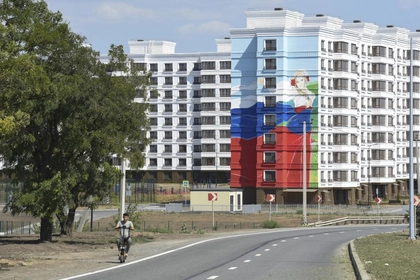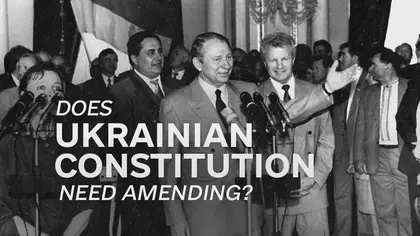Today, June 28, Ukraine’s Constitution Day, Kyiv Post asked two experts in constitutional law for their views on how the Organic Law has been working during wartime and whether it will need to be amended or improved after the victory.
Yulia Kyrychenko, expert in constitutional law at the Center of Political and Legal Reforms
JOIN US ON TELEGRAM
Follow our coverage of the war on the @Kyivpost_official.

The Ukrainian Constitution is consistent with the state's European and Euro-Atlantic integration policies. Amendments have been initiated with the participation of Petro Poroshenko, the fifth president, to the Preamble and the articles that specify the competences of all the branches of power – the parliament, the president and the government – in order to improve coordination in implementing these policies.
But after Ukraine wins the war, will this Constitution as a social contract fully satisfy the Ukrainian people? To that I still have a lot of questions. Written in 1996, it still contains quite a few Soviet-era terms. For example, the name "Verkhovna Rada" (Supreme Council) comes from the old Soviet notion of "the power of councils", meaning there was the higher council above councils at lower levels. Now we don't have that: we have the parliament and local self-governments.

Moscow Imposes Russian Car Insurance in Occupied Ukraine by 2025
The same is about the term "people's deputy". Most European countries have "members of parliament".
Actually, there have been no problems with the Constitution during martial law, but there remain serious threats. Most of all I'm concerned about the fact that the Constitution provides for a very short chain of transfer of authority. I mean we have the president. If anything happens to him, his authority is taken over by the parliamentary speaker. But then, if something else happens, there's no clear way forward. We can't hold elections during martial law.
Some European countries have five levels in that chain – five persons to take over. For a country that is in a state of full-blown war it's very important, but there are no relevant provisions [in our Constitution].
The Constitution also mentions the Russian language. In 1996, the Communist faction was still quite powerful, so the authors included its protection in the text. Of course, this provision must be deleted.
The constitutional procedure of introducing martial law did work and didn't create obstacles. We duly informed the United Nations and we have complied with all our international obligations concerning possible restrictions of constitutional rights during martial law.
But I believe that after our victory in this war the Ukrainian people should emerge as a political nation, so the Constitution should be adapted not by parliament acting on behalf of the Ukrainian people but directly by the Ukrainian people. I think it's very important that, in future, amendments to the Constitution be adopted through a national referendum.
Sergiy Panasyuk, PhD in Law, constitutionalist

There is nothing in the Constitution of Ukraine as the fundamental law that would preclude our state from joining the EU or NATO. By the way, the presence of the names "EU" and "NATO" in the text of the Constitution is not quite correct in technical terms. There are no proper names in constitutions, because the EU or NATO may change its name, and then we will have to make an amendment to our Constitution.
As far as amendments are concerned, our Constitution has a separate article that guarantees protection of Russian and other languages. It's Article 10 that guarantees the free use, development and protection of Russian and other languages of national minorities in Ukraine. That should be amended to make the constitutional provisions universal.
There is a question about same-sex marriage. The Constitution of Ukraine mentions [marriage as] "the right of a man and a woman" while the European Convention on Human Rights says that it's the right of men and women, without specifying that a marriage has to be heterosexual.
There are problems with the restrictions of the constitutional right to travel abroad: the constitutional procedure was violated when the government prohibited male Ukrainian citizens to leave Ukraine. The restrictions were imposed by a bylaw instead of a law as required by the Constitution.
We have a document on sovereignty, a document on independence and the Constitution. These three documents are historically connected and refer to each other. The Declaration of the State Sovereignty of Ukraine indicates that Ukraine must be non-aligned. This issue needs to be clarified in the Constitution or the Constitutional Court.
I believe that the Constitution should provide for mandatory vetting of all international acts for their constitutionality. For example, the Verkhovna Rada ratified the Statute of Rome, but the Constitutional Court overrode it.
I also believe it's necessary to rewrite Article 111 on impeachment of the president. When a pro-presidential faction in parliament has the absolute majority, the parliamentary-presidential republic may turn into a presidential one with an authoritarian bias. That's why this article should contain some safeguard norms.
You can also highlight the text and press Ctrl + Enter






